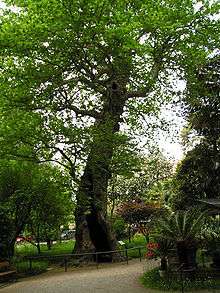Ombra mai fu
"Ombra mai fu" is the opening aria from the 1738 opera Serse by George Frideric Handel.
Context
The opera was a commercial failure, lasting only five performances in London after its premiere. In the 19th century, however, this aria was rediscovered and became one of Handel's best-known pieces. Handel adapted the aria from the setting by Giovanni Bononcini who, in turn, adapted it from the setting by Francesco Cavalli. All three composers had produced settings of the same opera libretto by Nicolò Minato.
Music
 |
|
| Problems playing this file? See media help. | |
Originally composed to be sung by a soprano castrato (and sung in modern performances of Serse by a countertenor, contralto or a mezzo-soprano), it has often been arranged for other voice types and instruments, including solo organ, solo piano, violin and piano, and string ensembles, often under the title "Largo from Xerxes", although the original tempo is marked larghetto.
In the opera, the aria is preceded by a short recitativo accompagnato of nine bars, setting the scene ("Frondi tenere e belle"). The aria itself is also short; it consists of 52 bars and typically lasts 3 to 4 minutes.
The instrumentation is for a string section: first and second violins, viola, and basses. The key signature is F major, the time signature is 3/4 time. The vocal range covers C4 to F5 with a tessitura from F4 to F5.
Words

The title translates from the Italian as "Never was a shade". It is sung by the main character, Xerxes I of Persia, admiring the shade of a plane tree.
Frondi tenere e belle |
Tender and beautiful fronds |
Cultural references
Performances of this aria are included in several movies. A fully staged version appears in the film Farinelli (1994), a fictionalized biography which recounts the tumultuous relationship between Handel and the famed castrato Farinelli even though in reality the two never worked together. The piece is also featured in Dangerous Liaisons (1988), in the original Italian, and Pride and Prejudice (TV version, 1995), which used English-language lyrics. Given the setting of these two movies/novels (1780s France and England in the early 19th century), when "Ombra mai fu" was still in obscurity, inclusion of these performances, while not technically anachronistic, would probably not have been recognized by contemporary audiences.
On 24 December 1906, Reginald Fessenden, a Canadian inventor and radio pioneer, broadcast the first AM radio program, which started with a phonograph record of "Ombra mai fu" followed by him playing "O Holy Night" on the violin and singing the final verse. The aria therefore was the first piece of music to be broadcast on radio.[1][2] The singer was probably Clara Butt.[3]
References
- ↑ Collins, Ace, [2001], Stories Behind the Best-loved Songs of Christmas, Grand Rapids, MI, Zondervan,p.137-138
- ↑ Early Radio History web-site quoting "Builder of Tomorrows" by Helen Fessenden, 1940, pages 153-154, Accessed 7 December 2010
- ↑ Bill Brewster and Frank Broughton, Last Night a DJ Saved My Life: The History of the Disc Jockey. Retrieved 12 April 2014
External links
Free scores of "Ombra mai fu" in the Choral Public Domain Library (ChoralWiki)
- "Ombra mai fu": Scores at the International Music Score Library Project
- "Ombra mai fu" at The Aria Database